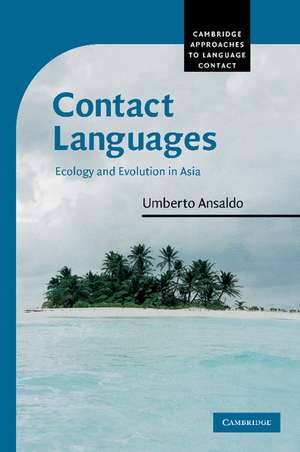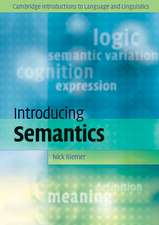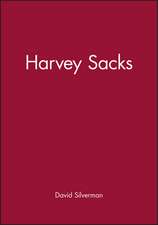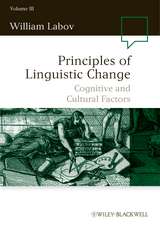Contact Languages: Ecology and Evolution in Asia: Cambridge Approaches to Language Contact
Autor Umberto Ansaldoen Limba Engleză Paperback – 21 aug 2013
| Toate formatele și edițiile | Preț | Express |
|---|---|---|
| Paperback (1) | 284.39 lei 6-8 săpt. | |
| Cambridge University Press – 21 aug 2013 | 284.39 lei 6-8 săpt. | |
| Hardback (1) | 726.23 lei 6-8 săpt. | |
| Cambridge University Press – 14 oct 2009 | 726.23 lei 6-8 săpt. |
Din seria Cambridge Approaches to Language Contact
-
 Preț: 190.92 lei
Preț: 190.92 lei -
 Preț: 415.99 lei
Preț: 415.99 lei -
 Preț: 329.83 lei
Preț: 329.83 lei -
 Preț: 334.29 lei
Preț: 334.29 lei -
 Preț: 457.25 lei
Preț: 457.25 lei -
 Preț: 368.82 lei
Preț: 368.82 lei -
 Preț: 328.40 lei
Preț: 328.40 lei -
 Preț: 360.26 lei
Preț: 360.26 lei -
 Preț: 287.87 lei
Preț: 287.87 lei -
 Preț: 249.29 lei
Preț: 249.29 lei -
 Preț: 319.99 lei
Preț: 319.99 lei -
 Preț: 284.01 lei
Preț: 284.01 lei -
 Preț: 320.75 lei
Preț: 320.75 lei -
 Preț: 282.10 lei
Preț: 282.10 lei -
 Preț: 359.80 lei
Preț: 359.80 lei -
 Preț: 286.89 lei
Preț: 286.89 lei -
 Preț: 283.79 lei
Preț: 283.79 lei -
 Preț: 215.06 lei
Preț: 215.06 lei - 14%
 Preț: 723.09 lei
Preț: 723.09 lei -
 Preț: 186.73 lei
Preț: 186.73 lei - 14%
 Preț: 752.08 lei
Preț: 752.08 lei
Preț: 284.39 lei
Nou
Puncte Express: 427
Preț estimativ în valută:
54.42€ • 59.10$ • 45.72£
54.42€ • 59.10$ • 45.72£
Carte tipărită la comandă
Livrare economică 22 aprilie-06 mai
Preluare comenzi: 021 569.72.76
Specificații
ISBN-13: 9780521682534
ISBN-10: 0521682533
Pagini: 276
Ilustrații: black & white illustrations
Dimensiuni: 152 x 229 x 14 mm
Greutate: 0.37 kg
Editura: Cambridge University Press
Colecția Cambridge University Press
Seria Cambridge Approaches to Language Contact
Locul publicării:Cambridge, United Kingdom
ISBN-10: 0521682533
Pagini: 276
Ilustrații: black & white illustrations
Dimensiuni: 152 x 229 x 14 mm
Greutate: 0.37 kg
Editura: Cambridge University Press
Colecția Cambridge University Press
Seria Cambridge Approaches to Language Contact
Locul publicării:Cambridge, United Kingdom
Cuprins
Part I. Introduction: 1. Introduction to contact language formation; 2. Research questions; 3. The role of ecology in Asian contexts; 4. Theory of language and contact language formation; 5. Contact language formation beyond exceptional evolution; 6. Outlook; Part II. The Ecology of Monsoon Asia: 7. Monsoon Asia; 8. Sino-Javanese trade; 9. The city-ports; 10. Manpower in Southeast Asia; 11. The Western impact; Part III. Linguistic Ecologies of Southeast Asia: 12. Southeast Asia and the role of Malay; 13. Malay contact varieties; 14. Introducing contexts of formation; 15. The role of Portuguese in Southeast Asia and Southern China; 16. Summary; Part IV. Methodological Issues in the Study of Contact Languages: 17. The ideology of theory; 18. Multilingualism and transmission; 19. Conclusions; Part V. Contact Language Formation in Evolutionary Theory: 20. Competence, performance and socialization; 21. Language evolution and contact languages; 22. Functionalist assets for contact linguistics; 23. Conclusions; Part VI. Congruence and Frequency in Sri Lanka Malay: 24. The SLM community; 25. Selection and replication in SLM; 26. Freeing SLM from the chains of exceptionalism; 27. Final remarks; Part VII. Identity Alignment in Malay and Asian-Portuguese Diaspora: 28. The ecology of identity alignment; 29. Multiple alignments in contact settings; 30. Identity alignment and admixture; 31. Conclusions; Part VIII. Pidgin Ecologies of the China Coast: 32. Sociohistorical background of Europe-China relations; 33. The ecology of Macau and the Pearl River Delta; 34. Grammatical features of China Coast Pidgin; 35. The missing Makista link?; 36. Discussion; Part IX. Implications, Conclusions and New Horizons: 37. Theoretical and methodological implications; 38. Conclusions and new horizons; References; Index; Author index.
Recenzii
'Ansaldo offers a detailed and highly informative historical account of trade and power relations in the region … [this book is] very suitable for beginners as well as specialists, and I would certainly recommend it as a secondary textbook for students of linguistics and related areas.' Languages in Contrast
Notă biografică
Descriere
This book explores the social and structural dynamics that underlie the creation of new, or restructured, grammars.
















